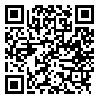Download citation:
BibTeX | RIS | EndNote | Medlars | ProCite | Reference Manager | RefWorks
Send citation to:



BibTeX | RIS | EndNote | Medlars | ProCite | Reference Manager | RefWorks
Send citation to:
Ghodsiyan N, Kiarad F. Evaluation and Validation of Factors Affecting Knowledge Transfer and Sharing among Professors Tehran University of Medical Sciences. Iranian Journal of Medical Education 2019; 19 :410-423
URL: http://ijme.mui.ac.ir/article-1-4541-en.html
URL: http://ijme.mui.ac.ir/article-1-4541-en.html
University of Tehran, Qom campus, Qom , narges_ghodsian@ut.ac.ir
Abstract: (3161 Views)
Introduction: Knowledge transfer is at the heart of knowledge management processes, which has been the focus of research today. The purpose of this study was to evaluate and validate factors affecting knowledge transfer and sharing among professors in Tehran University of Medical Sciences.
Methods: This is a descriptive survey of the quantitative part of a mixed study. The tool of this research is a questionnaire designed using qualitative section findings and was implemented in a stratified sample of 162 members of 1577 faculty members of Tehran University of Medical Sciences. Data were analyzed by path analysis using Lisrel.
Results: The questionnaire with a reliability of 0.97 and confirmatory factor analysis of GFI = 0. 90 and RMSEA = 0. 07 indicated the optimal fit of knowledge transfer model. Among the nine components of this model, the status of four components including knowledge and professors in Tehran University of Medical Sciences was desirable; although, the other five components, including the university and its relationship with professors and the environment for transferring knowledge to the university, were not been favorable.
Conclusion: The results of this study showed that in the process of knowledge transfer, the important points raised by university managers in the factor of university as an organization and its type of interaction with professors, knowledge and environment. Therefore, it is necessary to modify the promotion rules of the faculty in such a way as to encourage knowledge sharing among the professors. The design of a grants system in relation to industry and society should be developed to direct educational and research work in the universities to prevent the difusion of scientific work. It seems also important that colleges' academic trajectories complement each other to achieve the university's academic goals.
Methods: This is a descriptive survey of the quantitative part of a mixed study. The tool of this research is a questionnaire designed using qualitative section findings and was implemented in a stratified sample of 162 members of 1577 faculty members of Tehran University of Medical Sciences. Data were analyzed by path analysis using Lisrel.
Results: The questionnaire with a reliability of 0.97 and confirmatory factor analysis of GFI = 0. 90 and RMSEA = 0. 07 indicated the optimal fit of knowledge transfer model. Among the nine components of this model, the status of four components including knowledge and professors in Tehran University of Medical Sciences was desirable; although, the other five components, including the university and its relationship with professors and the environment for transferring knowledge to the university, were not been favorable.
Conclusion: The results of this study showed that in the process of knowledge transfer, the important points raised by university managers in the factor of university as an organization and its type of interaction with professors, knowledge and environment. Therefore, it is necessary to modify the promotion rules of the faculty in such a way as to encourage knowledge sharing among the professors. The design of a grants system in relation to industry and society should be developed to direct educational and research work in the universities to prevent the difusion of scientific work. It seems also important that colleges' academic trajectories complement each other to achieve the university's academic goals.
Keywords: knowledge Transfer, knowledge Sharing, knowledge Mmanagement, Tehran University of Medical Sciences
Type of Study: Original research article |
Subject:
Educational Management
Received: 2017/10/2 | Accepted: 2019/08/25 | Published: 2019/04/15 | ePublished: 2019/04/15
Received: 2017/10/2 | Accepted: 2019/08/25 | Published: 2019/04/15 | ePublished: 2019/04/15
پرسشنامه مطالعه [PDF 135 KB] (197 Download)
Send email to the article author
| Rights and permissions | |
 |
This work is licensed under a Creative Commons Attribution-NonCommercial 4.0 International License. |





